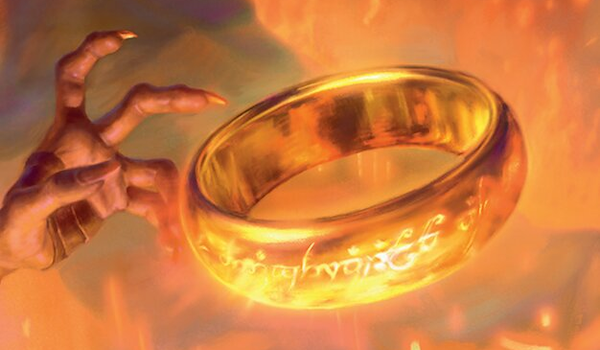Are you a Quiet Speculation member?
If not, now is a perfect time to join up! Our powerful tools, breaking-news analysis, and exclusive Discord channel will make sure you stay up to date and ahead of the curve.
This is a big one. "The only one." I am not going to pre-order The Lord of the Rings: Tales of Middle-Earth and I don't think you should, either.
Do I hate J.R.R. Tolkien? No, heavens no. I've read The Hobbit, The Lord of the Rings and the Silmarillion. I've even watched the movies and the Netflix show. Am I a fan? Not in my estimation, but I enjoy high fantasy settings including Middle-Earth. If that makes me a fan, then, so be it.
So why would I suggest not pre-ordering this new product? There's one big reason.
The Most Literal Card
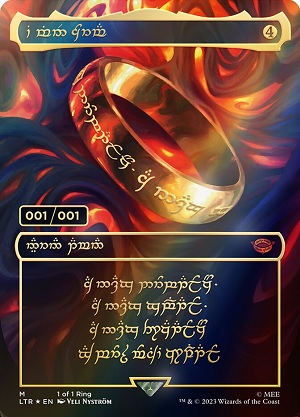
Call it the biggest marketing stunt in Magic history, but printing a one of one The One Ring is both interesting and concerning at the same time. There are already fairly reliable offers of $100,000 for the Ring, and Jim Davis at CoolStuff thinks it could be the first million dollar Magic card. Where we differ, however, is that while Jim thinks that's okay, I think this is definitely not okay.
The concept of one-of-one, ultra-premium "masterpiece" cards was developed by Fleer in 1997. This is not a new, original idea, so what is it? At best, Wizards trying to pressure you with FOMO; at worst, a complete scam.
There are going to be tens of thousands of copies of the Ring printed, with a bundle alt-art version guaranteed in every single box. There will be hundreds and thousands of special serialized and non-serialized Sol Ring printed in Quenya, the language of the High Elves. The set has the usual piles of variants in terms of showcase, double-rainbow foil, alternate art, etc. But the One Ring will only be available in English-language Collector Boosters. Except it's not really the One ring.
Now… If They Did Something Bolder
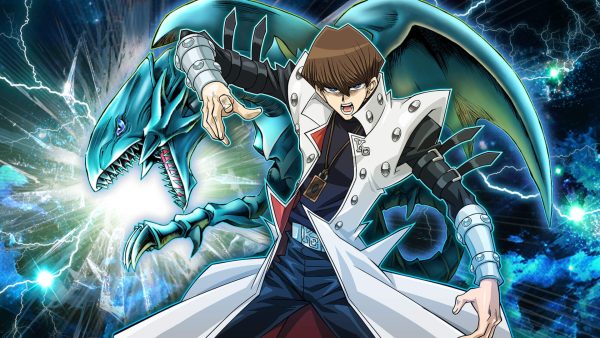
This is Seto Kaiba, a big bad villain in the Yu-Gi-Oh! universe who possessed the ultra-rare card, Blue-Eyes White Dragon. Kaiba had three of them, the most legally allowed in any deck. However, when he found out someone else had one, he challenged them to a duel, won the card, and then destroyed it. He did this so that he could be the only person to ever use the powerful card in a deck. If the One Ring in LOTR was like that, that there was exactly one of them, it would be brave, different, ultra-collectible; I might even buy two cases of Collector Boosters. However, a fancy thing that is artificially scarce?
Sound Familiar?
Wizards has done this before. There are plenty of examples to choose from. Look at the red ink variant of Hidetsugu, Devouring Chaos. Sure, there is not just one variant red ink copy of Hidetsugu. But there are going to be plenty of variants of the One Ring out there, too. Some napkin math is all you need to determine you should expect one red ink Hidetsugu in about 1300 Collector Boosters; you know, after opening over $40,000 of product. It's not "1 of 1" rarity, but that's still very rare, if artificially rare. What does that artificiality mean for pricing? Early on, these sold for thousands of dollars each, but now the price continues to decrease.
What about the first instance of serialized cards in BRO? They were selling at about the $1,000 level at launch, but now most are creeping under $300, much like the "rare" foil shattered glass Transformers cards introduced in the same set. Keep in mind each individual number is as rare as the One Ring. There can be only one 007 Wurmcoil Engine!
Magic is not new to cards having extremely low availability. However, that was based on authentic, low-print runs, many years later, and oddities like Alternate 4th Edition and Summer Magic. Now? Hype and speculation. When it comes to how collectible something is, these qualities simply do not hold the same weight.
All Flash and No Substance... Still Sells Cards
I understand Wizards needing to sell cards; that's their business, of course. The problem is when you use FOMO to drive sales, but are not making the product any better, you get downgraded.
Fundamentals. Card quality is the worst it has ever been. Foil cards are pre-bent "pringles," and many cards come pre-damaged in packs. While Wizards is busy counting their profits and raising prices, ordinary people are getting a worse product. How do you keep the hype machine oiled month after month? Golden Tickets, of course!
Magic has always been in the scratch-off business, but they have upgraded considerably to lottery status now. When printing $100,000+ cards, what security measures is Wizards taking to ensure a fair and truly random outcome, and what third party are they employing to verify this? If you know, please share. Additionally, what safeguards have they taken to ensure that this doesn't happen?
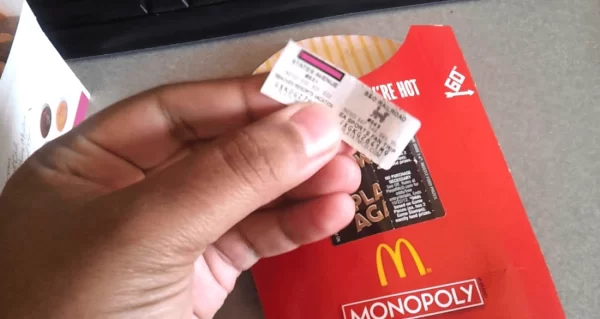
Once upon a time, McDonald's ran a Monopoly game that could award customers with cash and prizes. They even hired a marketing company to provide security and legitimacy, proving it was random. Furthermore, they hired an auditor to follow and verify that the most expensive game pieces, $1,000,000, were not being improperly distributed.
How did that go? The corrupt individual providing "security" switched game pieces secretly and made deals with people who "won" the best prizes, provided they pay them first. This only came out because they did this over and over again, many times, over years of games, until they were finally caught. Damningly, with the Ring, Wizards only has one chance to get it right.
Wizards Is No McDonald's
A FOMO-inducing marketing stunt at least, but at worst, the One Ring is a complete scam. If one of the most recognizable and largest brands in the world can't secure a contest, how is Wizards going to? And even if Wizards takes the same precautions, there is no guarantee it will be fair. However, the hype train has left the station, and this is where we get to tin-foil-hat levels of conspiracy thinking. I don't believe this, but, I have to consider outcomes especially in light of similar real world events.
The Magic community at large does not agree on much; however, I'm certain everyone wants to believe they could open a million dollar card in a pack. For Wizards, if no one opens the One Ring, people will wonder if it was all a marketing stunt with no substance. In theory, there cannot be evidence to the contrary. Think about that. If it's truly fair, if it's truly random as best as they can make it, Wizards cannot verify exactly where the Ring goes. If they could, then it's not much of a leap to suggest they seeded the outcome. What good is a hyped product that is never found?
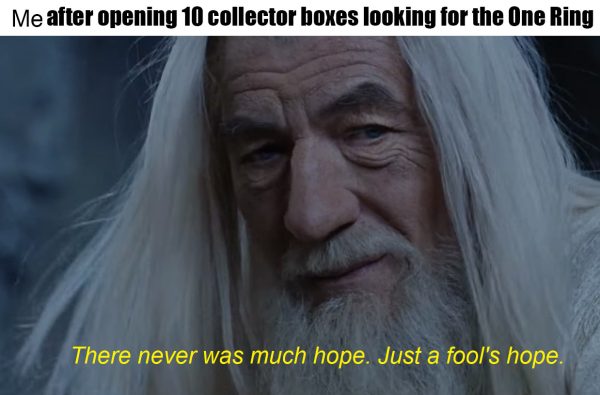
Given the large volume of new Magic that sits unopened, it's not a stretch to believe a single particular card could be languishing on a shelf, forever. Heck, there is so much new Magic product it ends up in landfills. This is a lose-lose for Wizards in most cases.
Secondary Market Prices Will Be Terrible
Pre-order prices are already through the roof for LOTR Collector boxes, and there is no inclination that this will be a limited product. It makes no sense to purchase any product after the first day of release. Would Wizards really wait to put the One Ring in a second print run of the set? That would mean anyone that pre-ordered had zero chance to get it.
So this brings us to the fact that secondary market prices are going to be literal pennies, as only pre-order Collector product makes any sense to purchase whatsoever; that's the stuff with the million-dollar prize. Sealed prices will explode, temporarily, and opened packs will be dumped into the market quickly.
You Can Still Win
For people who are not affected by FOMO and can wait, I see an easy way to collect all the cards you want for fractions of a penny, or to get sealed product from people who bought too much and didn't open the Ring. Black Lotus is a collectible; Summer Magic Blue Hurricane is a collectible. The One Ring? Artificial. Don't get caught up in FOMO, play the odds, and like Warren Buffet says: "Be fearful when others are greedy and greedy when others are fearful." In this case, the only winning move is not to play.


